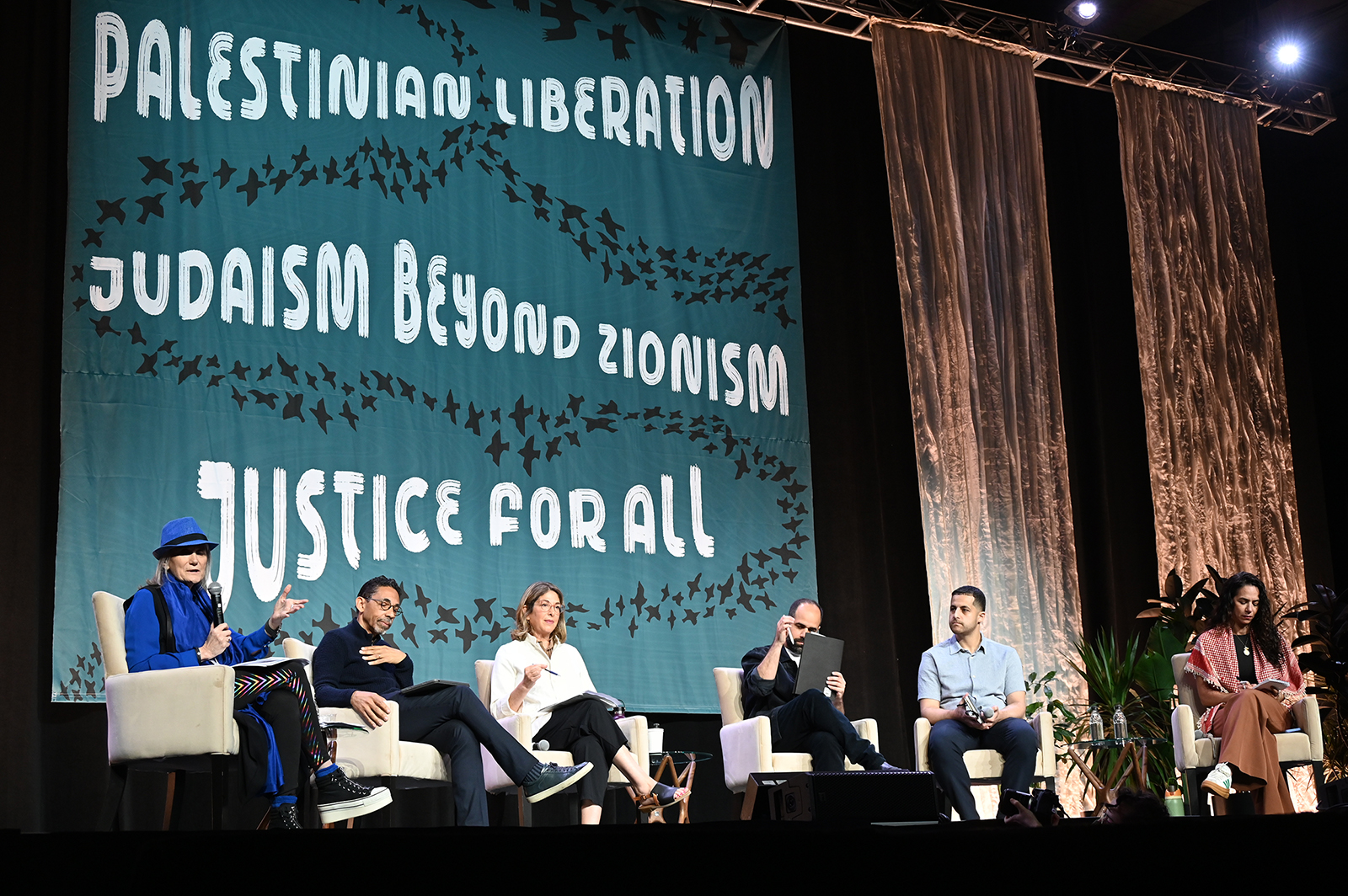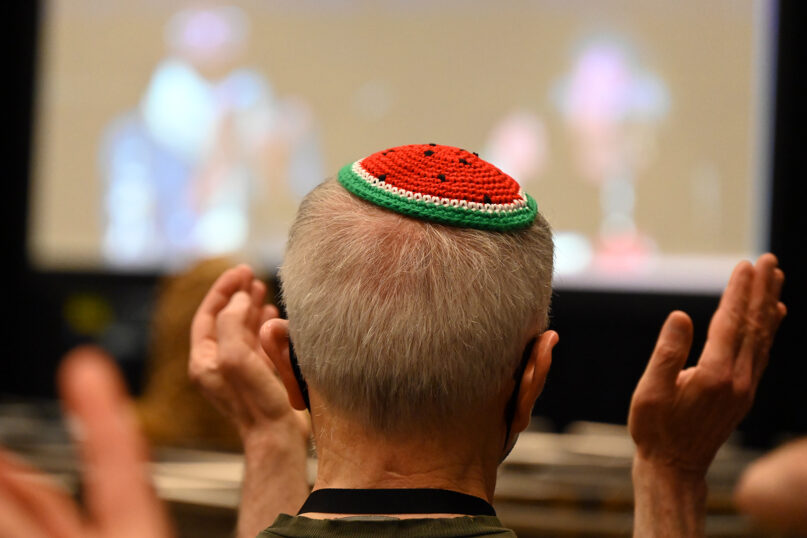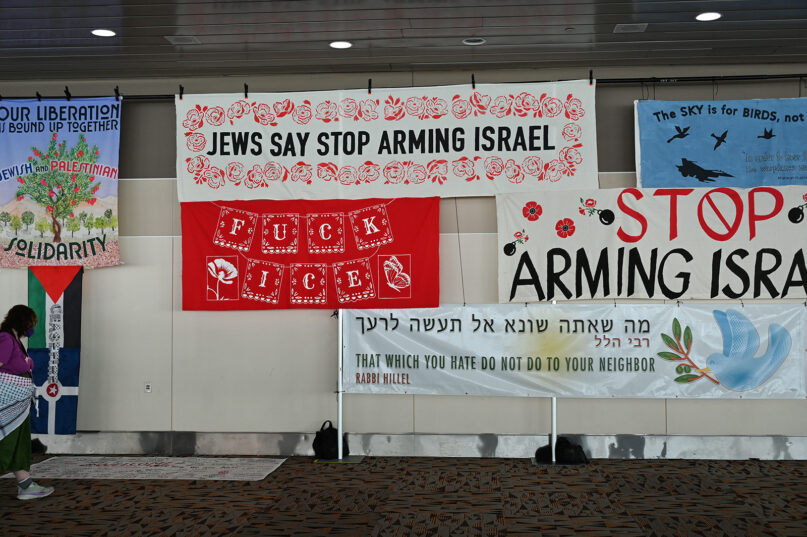
BALTIMORE (RNS) — When an organizer for Jewish Voice for Peace ran onstage shouting at the group’s member conference last weekend, the sprawling auditorium erupted in applause.
“Gaza!” the organizer shouted.
“We’ve got your back!” attendees replied.
The chant was repeated over and over, with the organizer switching out words to signal support for different groups — students, immigrants, transgender people and others. The crowd, some 2,000 strong, rose to its feet, fists pumping in the air. Many were donned in kiffeyehs, a black-and-white garment known as a symbol of Palestinian resistance. Others were adorned in yarmulkes made to resemble watermelons, which have become a pro-Palestinian emblem, as it shares the same colors as the Palestinian flag. Some, like the organizer onstage, wore shirts that read “Stop arming Israel.”
Suddenly, with a grin, the organizer — standing in front of a giant banner that read “Palestinian Liberation. Judaism Beyond Zionism. Justice for all” — shifted to a new, awkward chant.

A watermelon-styled yarmulke is worn at the Jewish Voice for Peace conference at the Baltimore Convention Center. (RNS photo/Jack Jenkins)
The organizer shouted: “I say ‘organizing dynamics’, you say, ‘can be really challenging!’”
The crowd bumbled through a first attempt, laughing all the while. But they eventually found the rhythm and began belting it out with gusto.
It was a light-hearted introduction to a group known for focusing on a decidedly serious topic: the Israel-Hamas war, which has claimed tens of thousands of lives over the past two years, the vast majority of them Palestinian, in what JVP members insist amounts to genocide. Since the outbreak of the violence, Jewish Voice for Peace, a progressive, anti-Zionist group, has emerged as an organizing powerhouse, gaining more than 20,000 members last year alone and a database of supporters that has swelled to more than 750,000, according to the group’s digital director.
The conference, held in Baltimore from April 31 through May 4, was by far the largest JVP has ever convened and featured big-name guests such as Rep. Rashida Tlaib, former congresswoman Cori Bush and activists Naomi Klein and Linda Sarsour.

An organizer engages the crowd, Friday, May 2, 2025, during the Jewish Voice for Peace conference held at the Baltimore Convention Center. (RNS photo/Jack Jenkins)
The surge in popularity has been striking for JVP, a decades-old group that has long been dismissed as fringe or even accused of being antisemitic — including by fellow Jewish groups. But, as speakers and organizers repeatedly lamented from the event stage, despite the group’s new visibility, they have yet to change the situation for people in Gaza. What’s more, their activism has never carried more risk, as pro-Palestinian protests have sparked backlash from the Trump administration and some corners of American Judaism.
For Stefanie Fox, executive director of JVP and its sister organization JVP Action, that tension is part of why the conference needed to happen.
“It’s in community that you can kind of face those contradictions and figure out what it’s going to take to keep fighting — even though it’s a bigger uphill battle than ever — and figure out what it’s going to take to keep growing — even though they’re making the cost of the work scarier all the time,” she said in an interview.
Indeed, community, particularly Jewish community, was paramount at the conference. Attendees, while not exclusively Jewish, were overwhelmingly so, and the program made accommodations for a wide spectrum of Jewish tradition. Spaces were set aside for rituals and services, including Shabbat. A program of events that was distributed to attendees included labels for people who are shomer Shabbat, indicating events that don’t use projectors or ask participants to use electronics.
In addition to plenary speakers, the conference hosted dozens of smaller panels and workshops on topics like Christian zionism, trans liberation, data analysis and organizing. There were also artistic and musical meetups, some of which were organic: Midway through the conference, a person began playing “Hava Nagila” and other songs on a piano in the main conference space, accompanied by a lone fiddler. On a balcony nearby, a separate group appeared to be bursting into song.
Attendees skewed young, a fact that excited panelist Phyllis Bennis, a fellow at the Institute for Policy Studies who spent six years on the board of Jewish Voice for Peace and now serves as an international adviser to the organization.
“What’s so incredible is the young people here,” said Bennis, author of “Understanding Palestine and Israel,” describing the newcomers as part of the “justice generation” that came of age amid the 2020 racial justice protests following the murder of George Floyd.
“They came up into those protests in the streets that whole summer, saying, ‘I want to be part of this. My identity as Jewish is about social justice.’ That was part of mine … but supporting Israel was supposedly part of that,” she said. “These guys coming up are saying: ‘Justice for everybody. And we want to be part of that. We don’t want to be separate.’”
She also noted that surveys have shown younger Jewish Americans are increasingly uncomfortable with Israel’s policies toward Palestinians, including a 2021 poll by the Jewish Electorate Institute showing that 38% of U.S. Jews under 40 believe “Israel is an apartheid state,” compared to 25% of Jews overall.

Phyllis Bennis, center, speaks during the Jewish Voice for Peace conference, Saturday, May 3, 2025, at the Baltimore Convention Center. (RNS photo/Jack Jenkins)
It’s this young, progressive stream of Judaism that has helped raise JVP’s profile over the last year and a half. Just days after Israel began its military response to the Hamas-led attack on southern Israel that left around 1,200 Israelis dead and hundreds more taken hostage, JVP drew national attention when they filled the rotunda of the House Cannon Office Building on the U.S. Capitol grounds with hundreds of Jewish activists wearing black-and-white T-shirts that read “Jews Say Ceasefire Now” and “Not In Our Name,” resulting in hundreds of arrests.
Ten days later, JVP staged another dramatic protest that shut down New York City’s Grand Central Station. Then they, along with partner organizations such as If Not Now, staged another in North Carolina. And another in Philadelphia. And another outside the White House. They quickly became a fixture of the movement, known for their well-organized, highly visible actions.
But three and a half months into the second Trump administration, the situation facing many of these activists has shifted dramatically, especially for students. Benjamin Kersten, a member-leader of JVP’s University of California, Los Angeles, chapter, said that as the one-year anniversary of the school’s original pro-Palestinian protest encampment approached in April, police came out in force.
“There must have been like 10 big cop car SUVs around the quad,” Kersten said.
Bennis argued such difficulties only enhance the need for JVP’s activism.
“Jewish lives and Jewish safety in the context of antisemitism are being weaponized,” she said. “We talk about antisemitism being weaponized, but it’s really the claimed danger to lack of safety for Jewish students, for Jewish community members, that’s the excuse for this. That puts a real obligation on us to say: ‘No, our safety does not require, and cannot be achieved, with this kind of massive, discriminatory, racist policing. This is not what keeps us safe.’”

Panelists at the Jewish Voice for Peace conference, Saturday, May 3, 2025, at the Baltimore Convention Center. (RNS photo/Jack Jenkins)
Some of that work has already begun, organizers say. In March, JVP staged a protest inside Trump Tower in New York City against the attempt to deport a pro-Palestinian activist. And just this week, JVP Action brought nine Jewish students from Columbia University to meet with lawmakers on Capitol Hill to speak about their experience “advocating for the safety and freedom of the Palestinian people.”
However, some of the political power JVP accrued on Capitol Hill has diminished. Progressive Democrats, particularly members of the left-leaning “squad,” rallied with the group last year, but some, such as former Missouri Rep. Cori Bush, lost their reelection bid. Bush has cast blame for her loss on the influence of the pro-Israel group AIPAC, which spent millions on an effort to unseat her.
Bush, who spoke at the closing plenary session, sparked several seconds of raucous applause as she voiced her own defiant take on her election loss.
“Although AIPAC thinks that removing me from office stopped something, although they think that they did something great and they set this example; what they did was just cut the little itty, bitty strings that I had that was stopping me from being able to get around and do the things, other things that I could do,” Bush said. “On the night of my election, when I said, ‘AIPAC, I am coming to tear your kingdom down,’ I meant what I said.”
But setbacks appear to have galvanized JVP members and supporters, who spoke often at the conference about the need to build concrete political power.

Banners line a wall at the Jewish Voice for Peace conference at the Baltimore Convention Center, Friday, May 2, 2025. (RNS photo/Jack Jenkins)
“I think we need to be building a bench of politicians who are accountable to us, who are accountable to our movement, and effectively ensuring that we have a whole new generation entering the political arena, a generation for whom you cannot be progressive without Palestine,” Eman Abdelhadi, a professor at the University of Chicago, said during a panel.
Stefanie Fox said JVP is also focused on “short-term and long-term” work, hoping to grow local chapters. But Fox stressed that organizing challenges of the moment, as difficult as they are, are all secondary. Many members, she said, don’t feel they have the luxury to slow down their activism, noting the continued actions by the Israeli military in Gaza and the ongoing risk of starvation facing Palestinians in the region.
“It’s a catastrophe that’s escalating by the second,” Fox said. “So, we’re moving forward.”
